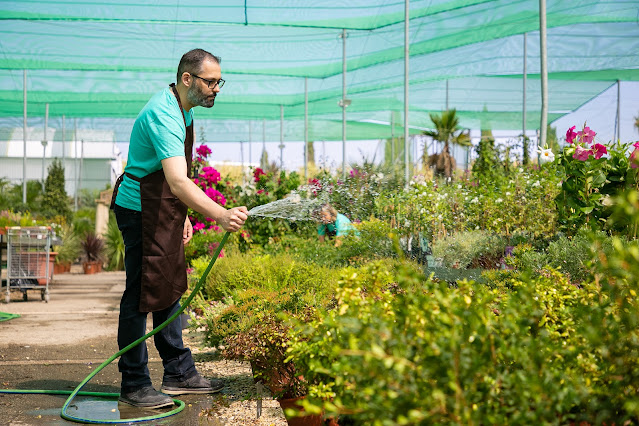Have you ever considered becoming a skilled gardener? Gardening is a rewarding hobby that offers numerous benefits to both your physical and mental health. It's also an environmentally friendly practice that promotes sustainable living. This article will explore the life-changing advantages of honing your gardening skills and how it can positively impact your life
The life-changing advantages of honing your gardening skills:
Physical Health Benefits of Gardening:
Gardening is a fantastic way to stay active and improve your physical health. Here are some of the ways gardening can benefit your body:
- Exercise: Gardening involves various activities like digging, planting, and weeding, which help burn calories and strengthen muscles. It's a great low-impact workout that can be enjoyed by people of all ages and fitness levels.
- Vitamin D: Spending time outdoors in the sunlight can help increase your body's vitamin D production, which is essential for maintaining healthy bones and immune system function.
- Improved flexibility and balance: The various movements involved in gardening can help improve your flexibility and balance, reducing the risk of falls and injuries.
- Hand-eye coordination: Gardening requires precise movements and attention to detail, which can help sharpen your hand-eye coordination.
Mental Health Advantages:
Gardening is not only beneficial for your physical health but also your mental well-being. Here are some ways gardening can improve your mental health:-
- Stress reduction: Spending time in nature and engaging in relaxing activities like gardening can help lower stress levels and improve mood.
- Mindfulness: Gardener encourages you to focus on the present moment, fostering a sense of mindfulness and helping to reduce anxiety.
- Sense of accomplishment: Watching your garden grow and flourish can provide a sense of achievement and satisfaction.
- Creativity: Planning and designing your garden allows you to express your creativity and individuality.
The Environmental Impact of Gardening:
Becoming a skilled gardener can also have a positive impact on the environment. Here's how:
- Reducing your carbon footprint: Growing your own fruits and vegetables can help reduce your carbon footprint by cutting down on the transportation and packaging associated with store-bought produce.
- Supporting biodiversity: Planting a variety of flowers, shrubs, and trees can provide habitats and food sources for local wildlife, promoting biodiversity in your area.
- Soil preservation: Practicing sustainable gardening techniques like composting and crop rotation can help maintain healthy soil and prevent erosion.
- Water conservation: By using water-saving methods like rainwater harvesting and drip irrigation, you can reduce your water consumption and contribute to conserving this precious resource.
Sustainable Living through Gardening:
Gardeners can play a significant role in promoting a sustainable lifestyle. Here are some ways gardening can help you live more sustainably:
- Growing your own food: Producing your own fruits and vegetables can reduce your reliance on store-bought produce, which often comes with excessive packaging and a larger carbon footprint.
- Composting: Turning your kitchen scraps and garden waste into nutrient-rich compost benefits your plants and helps reduce the amount of waste sent to landfills.
- Organic gardening: By using organic gardening methods and avoiding chemical pesticides and fertilizers, you can minimize your impact on the environment and protect the health of your family and local wildlife.
- Edible landscaping: Incorporating edible plants into your landscape design can provide food for your family while also creating a beautiful, functional outdoor space.
Developing Valuable Gardening Skills:
Becoming a skilled gardener involves learning a variety of valuable skills that can be applied to other areas of your life:
- Time management: Gardening requires planning and organization, helping you develop effective time management skills.
- Problem-solving: Overcoming challenges like pests and diseases in your garden can help sharpen your problem-solving abilities.
- Patience: Gardening teaches you the importance of patience, as you wait for seeds to germinate and plants to grow.
- Responsibility: Caring for a garden requires commitment and responsibility, as you must regularly tend to your plants' needs.
Strengthening Social Connections:
- Community gardens: Participating in a community garden can provide opportunities to connect with neighbors and like-minded individuals.
- Gardening clubs and workshops: Joining a gardening club orgardener langwarrin attending workshops can help you learn from others and share your knowledge and experiences.
- Online gardening communities: Connecting with fellow gardener Langwarrin through online forums and social media can provide support, advice, and inspiration.
Financial Savings and Self-Sufficiency:
Growing your own fruits, vegetables, and herbs can lead to significant financial savings and increased self-sufficiency:
- Lower grocery bills: Producing your own food can help reduce your grocery expenses, especially if you grow high-value crops like tomatoes, peppers, and herbs.
- Preserving your harvest: Learning to preserve your garden's bounty through canning, freezing, or drying can provide you with a year-round supply of homegrown food.
- Bartering and sharing: Exchanging surplus produce with friends, neighbors, or local food banks can help foster a sense of community and self-sufficiency.
Conclusion:
Becoming a skilled gardener offers a multitude of life-changing benefits, from improving your physical and mental health to promoting environmental sustainability and self-sufficiency. By investing time and effort into developing your gardening skills, you can reap the rewards of a healthier, more fulfilling, and environmentally conscious lifestyle. So, why not grab a trowel and start sowing the seeds of a better future today?
For more information about us, please refer to the details below:
Business Name: My Hardy Yardy
Address: 4 Bokissa Drive Frankston VIC 3199 Australia
Tel: 0417 640 008
Email: info@myhardyyardy.com.au




0 comments :
Post a Comment